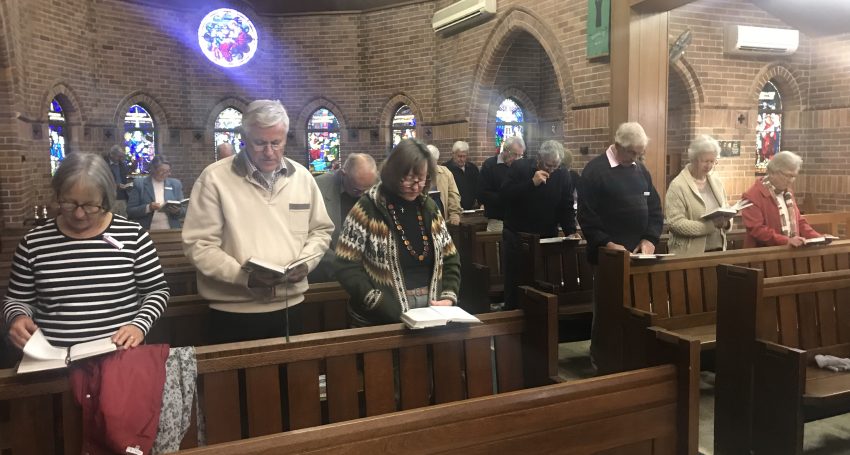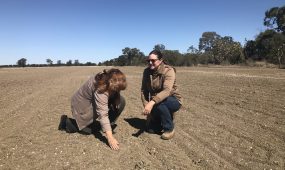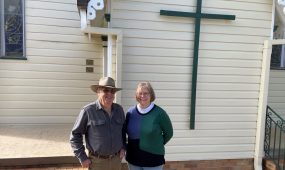Can we pray for rain?
Bush Ministry Fund
The Ven. Keith Dean-Jones asks whether we can pray for rain while in the grip of drought and, if so, what does praying for rain mean?

Queensland is in the grip of a severe drought. For many years, the Western regions have experienced low rainfall, and the drought has spread to the coast, including to Bundaberg where my parish is based. It is very dry in Bundaberg and we can appreciate some of the difficulties that face farmers and graziers in other parts of the State.
There is a severe drought in Australia about once every eighteen years, and the last ‘great dry’ for Queensland was from the second half of 1991 to 1995. Even though there has been a return to seasonable weather, there has been a gradual decrease in precipitation in the first part of this century, which many scientists attribute to climate change. The coming months will be difficult for both people living on the land and in towns.
Advertisement
Can we pray for rain? In the 1662 Book of Common Prayer there was a petition: “Send us, we beseech thee, in this our necessity, such moderate rain and showers, that we may receive the fruits of the earth to our comfort, and thy honour.” This prayer was omitted in the 1978 An Australian Prayer Book, and the petition read: “Look in mercy on your people and hear our prayer for those whose lives and livelihood are threatened by drought (p.92).” There was no prayer for rain. In the 1995 A Prayer Book for Australia, prayer for rain was once again included: “Send us, we pray, in this time of need, rain to water the earth, that we may receive its produce to strengthen and sustain us (p.205).” These changes are important because our prayers express what we believe. The Latin phrase ‘lex orandi lex credendi’ (‘the law of praying is the law of believing’) shapes private prayer, public liturgy and action in the world. Our present liturgy was presented to the General Synod of the Church during the last year of the great dry!
If we pray for rain, there are a few things that we need to keep in mind.
First, our prayer must be the prayer of the risen Lord Jesus Christ. Prayer is not telling God things that He does not know, and it is not trying to change His attitude. God knows all things and His will is perfect. In praying, we endeavour to share in the prayer of the risen Lord Jesus and to be at one with the will of God. Writing to the Church of Rome, the Apostle Paul reminds his readers that “we do not pray as we ought, but the Spirit intercedes for us with sighs too deep for words (Romans 8:26).” This means that we need to listen carefully before we offer our petitions. We are to pray in faith (James 1:5), and our faith is expressed in our readiness to listen carefully to Jesus and to follow His directions. This is another way of expressing the injunctions that we are to pray ‘according to His will’ and in the ‘name of Jesus’.
Related Story
 Bush Ministry Fund
Bush Ministry Fund
The drought: what can the broader community do to help?
Secondly, we need to keep in mind that droughts and floods are natural occurrences. I think that we need to pray that “we may live in harmony with your creation” and exercise “wisdom and generosity in our use of its bounty” (A Prayer Book for Australia, p.184). We should not be merely trying to make the natural order suit us. This is not to blame primary producers, but it is to affirm that land, sea and sky are fragile.
Thirdly, we are called to repent of our failure to be good stewards of creation. Until about thirty years ago, we were unaware of the serious consequences of the burning of fossil fuels, the destruction of forests and the eradication of plants and animals. There has been a remarkable change in attitudes, and most Australians support the use of renewable energy (hydro, solar and wind), reforestation, policies that promote bio-diversity and restrictions placed on the disposal of plastic bags and bottles. We need to ask God to forgive us for our failure to be good stewards of the earth, which He has given to us.
Fourthly, we are challenged to help those who suffer the most. The English word ‘intercession’ comes from the Latin word ‘intercedere’, which means ‘to be placed in the centre of a conflict’. We cannot pray for those who suffer if we are not prepared to share in their suffering (this is the meaning of the Latin-English word ‘compassion’). We are “to be doers of the word, and not merely hearers who deceive themselves (James 1:22).”
The Archbishop has asked people in the Diocese to help those affected by the drought, such as through his Drought Appeal, and donations to parishes in the Western region and to the Bush Ministry Fund are very welcome. After all, prayer without action is a failure to be responsible.





